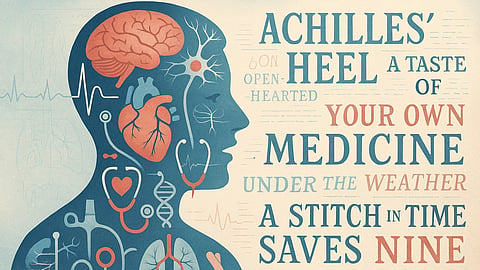Bone of contention - A point of disagreement or dispute. (Metaphor from fighting over a bone; widely used in English).
Example: The border dispute between India and Pakistan has been a bone of contention for decades.
Tongue-lashing - A severe verbal reprimand; harsh scolding. (Metaphor: tongue as the instrument of speech tied to “lash”.)
Example: The manager gave him a tongue-lashing for missing the deadline.
Vitriolic attack - Extremely bitter, acid-like criticism. (From “vitriol” -corrosive substance; used figuratively for harsh language.)
Example: The column was a vitriolic attack on the new policy.
Pregnant with significance - Full of meaning or implication. (Metaphorical “pregnant” = containing something about to be revealed.)
Example: Her brief remark was pregnant with significance.
Abrasive - Rough or harsh in manner or style. (From abrasion; in language, describes tone that “wears away” goodwill.)
Example: His tone during the meeting was abrasive.
Visceral (visceral reaction/attack) - A gut-level, strongly felt response (often emotional and immediate). (From viscera = internal organs; implies deep, bodily feeling.)
Example: She felt a visceral reaction to the news.
Gut feeling / gut instinct - A rapid, intuitive judgment. (Linked to “viscera”; widely studied in psychology as intuition.)
Example: My gut feeling told me not to accept the offer.
Go under the knife - To have surgery. (Literal; commonly used metaphorically.)
Example: He’s going under the knife next week for his knee.
On the mend / back on one’s feet - Recovering after illness or setback. (Medical recovery metaphor.)
Example: After the flu, she was finally on the mend.
Bitter pill to swallow - An unpleasant but unavoidable fact to accept. (Medicine imagery.)
Example: Losing the promotion was a bitter pill to swallow.
A Taste of your Own Medicine - Experiencing the same unpleasant treatment or situation that one has put others into.
Example: The prankster finally got a taste of his own medicine when his friends played a trick on him.
Palpable - Easily perceptible; obvious. (Medical term meaning able to be touched or felt.)
Example: There was a palpable tension in the room.
Spasmodic - Occurring intermittently; irregular. (From “spasm,” sudden muscular contraction.)
Example: He made spasmodic appearances at team training.
Hiatus - A break or pause. (Used in medicine for gaps; in general English, means interruption.)
Example: I met Mohit after a hiatus of seven years.
Clinical precision (as compliment) - Efficient, detached, precise, often used of performance.
Example: Kapil Dev batted with clinical precision.
Cul-de-sac (figurative) - French phrase meaning bottom of the bag or closed bag. A blind end; a situation with no progress. (Literally a dead-end street.)
Example: Their investigation met a cul-de-sac.
Yawning gap - A very large and obvious difference or divide. (“Yawning” = wide open like a mouth.)
Example: There is a yawning gap between rich and poor.
Jaundiced view - A biased, cynical, or prejudiced perspective. (From jaundice, a yellowing illness historically thought to affect temperament.)
Example: My uncle has jaundiced views about new technology.
Sartorial elegance - Elegance in dressing. (Derived from “sartorial” -tailoring; etymology linked to Latin sartor = tailor.)
Example: The lady displayed sartorial elegance at the event.
Knucklehead - Informal: a foolish or stubborn person. (Slang; not strictly medical but uses bodily term.)
Example: Don’t be a knucklehead, read the instructions.
Go for the jugular / go jugular - To attack the most vulnerable and crucial point. (Jugular vein is vital; metaphor for decisive attack.)
Example: The investigators went jugular on the corruption case.
Cardinal (rule/importance) - Primary, fundamental, or principal. (From Latin cardo = hinge, related to “cardio” for heart historically; means central.)
Example: A cardinal rule of safety is to check equipment before use.
Palpable error - An obvious mistake that can be clearly identified. (Uses medical “palpable” imagery.)
Example: There is a palpable error in the policy document.
Genuflect (figurative) - Show excessive deference or submission. (Originally physical kneeling in worship, used metaphorically.)
Example: He refused to genuflect to the lobbyists.
Achilles heel - comes from Greek mythology. Achilles was a great warrior whose mother dipped him in the River Styx to make him invulnerable, except for the heel she held him by. In anatomy, the Achilles tendon (at the back of the ankle) is named after him. The term later evolved to mean a critical weakness in an otherwise strong person, system, or organization.
Example: Cybersecurity remains the Achilles’ heel of many modern companies.


